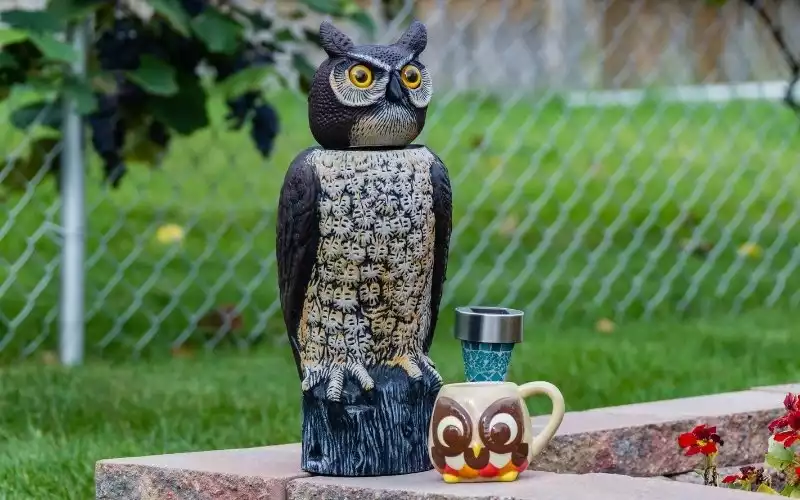So those deer you thought were cute have been rummaging through your garden and now you want them to stay away?
Congrats, you’re officially a gardener now! So many of us have dealt with this exact scenario and just want to know how we can keep deer out of the garden.
Growing deer resistant plants can be a great way to help mitigate the problem, and save some of your garden for your family to actually be able to eat.
I compiled a list of deer resistant plants, flowers, shrubs, annuals, and perennials.
I broke this large list down into a few sections to make it easier to find what you’re looking for. I’ve also included lists of plants that deer LOVE to eat, so you can keep a closer eye on those this year.
Herbs
There are plenty of deer resistant herbs you can grow to help keep deer from ruining your garden. While most deer tend not to bother these, some deer get desperate so don’t expect these to be 100% foolproof.
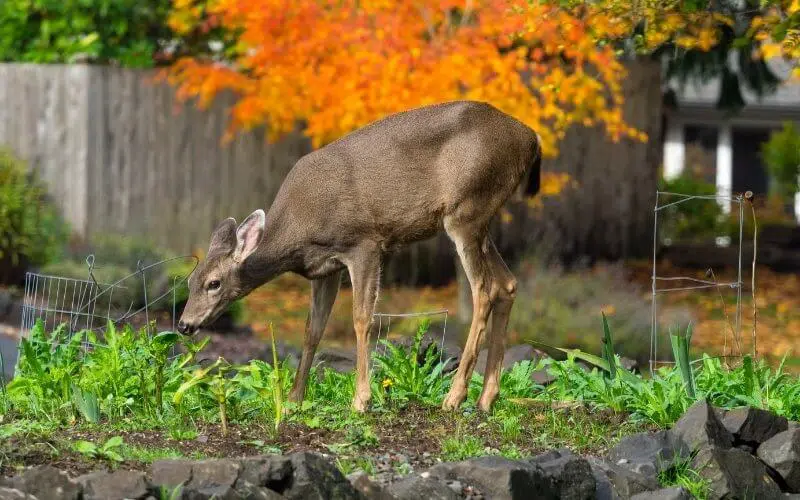
Deer Resistant Herbs
Since a lot of herbs have very strong scents, there are quite a few that repel deer. The ones in bold are thought to be the most effective.
- Anise
- Basil
- Bee Balm
- Borage
- Catnip (nepeta sp)
- Chives
- Chamomile
- Cilantro
- Dill
- Fennel
- Garlic Chives
- Germander
- Ginger
- Horseradish
- Lemongrass
- Lemon Balm
- Lavender
- Lungwort
- Marjoram
- Mint
- Oregano
- Parsley
- Rosemary
- Sage (especially Russian Sage)
- Tarragon
- Thyme
- Yarrow
Herbs Deer Love
There are not many herbs that deer will enjoy eating, although if they get hungry enough, you never know.
Fruits & Vegetables
This is a BIG list, mainly because deer love scouring the garden for delicious foods to eat.
Deer Resistant Fruits & Vegetables
There are quite a few deer resistant vegetables. While these aren’t necessarily going to keep deer from running rampant in your garden, these are generally options that deer avoid. Remember, deer will eat plants they usually wouldn’t if they get desperate enough.
- Artichoke
- Asparagus
- Beets
- Cucumbers
- Eggplant
- Fennel
- Garlic
- Ginger
- Leeks
- Okra
- Onions
- Parsnips
- Peppers
- Potatoes
- Radishes
- Rhubarb
- Scallions
- Squash
- Zucchini
Fruits & Vegetables Deer Love to Eat
This list is probably the longest on here because deer loves fruits and vegetables. Guard these ones extra carefully.
- Apples
- Blackberry
- Broccoli
- Barberry (berberis sp)
- Bee Balm
- Beans
- Brussels Sprouts
- Cabbage (ornamental cabbage)
- Carrots
- Celery
- Cucumbers
- Cauliflower
- Collard Greens
- Corn
- Eggplant
- Gourds
- Grapes
- Kale
- Lemon Trees
- Lettuce
- Okra
- Peppers
- Pumpkins
- Potatoes
- Raspberries
- Spaghetti Squash
- Spinach
- Strawberries
- Sweet Potatoes
- Tomatoes
- Watermelon Plants
- Yarrow
- Zucchini
Shrubs & Bushes
Deer Resistant Shrubs & Bushes
Herbs and vegetables aren’t the only options for keeping them out of your yard. There are a number of deer proof bushes as well.
- Barberry
- Bluebeard
- Butterfly Bush
- Chinese Juniper
- Common Boxwood
- Eastern Red Cedar
- Fragrant Sumac
- Green Giant (thuja)
- Pacific Wax Turtle
- Sagebrush
- Spireas
Shrubs & Bushes Deer Love
- Azalea
- Camellia
- Hydrangeas
- Rhododendrons
- Roses
- Wintercreeper
- Yew shrubs
Flowers
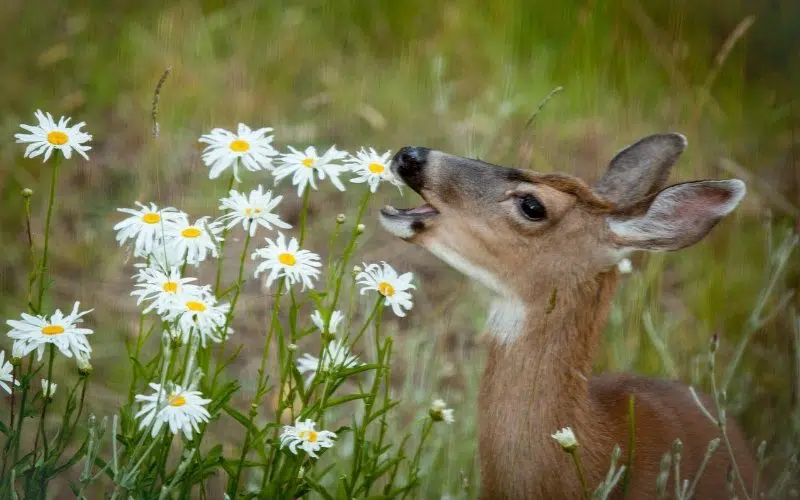
Flowers that have very fragrant blooms do well for keeping Bambi away.
Deer Resistant Flowers
Here are some flowers deer tend to avoid, separated by annuals and perennials to help you with your garden planning.
Annuals
- Foxgloves (biennials – careful, these are poisonous plants)
- Poppies
- Roses
- Spider Flowers (cleome sp)
- Verbena
- Zinnias
Perennials
- Bleeding Hearts
- Coneflowers
- False Goat’s Beard (astilbe sp)
- Lavender
- Peonies (paeonia sp)
- Roses
- Tickseed (Coreopsis)
Flowers Deer Love to Eat
As you can see in the picture above, deer will absolutely eat flowers. Here are some of their favorites:
Annuals
Deer resistant annuals include:
- Asters
- Coleus
- Dahlia
- Geraniums
- Impatiens
- Lilies (can be considered perennials)
- Marigolds
- Morning Glory
- Petunias
- Sunflowers
Perennials
Deer resistant perennials include:
- Buttercups
- Crocus
- English Ivy
- Hostas
- Lilies
- Pansies
- Phlox
- Tulips
- Violas
Ornamental Grasses
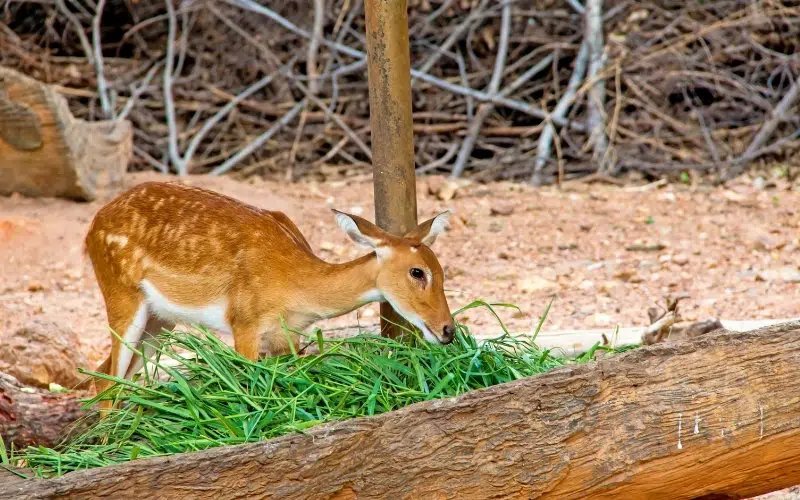
If you’re looking for deer resistant ornamental grasses, this list is a good one:
- Black Mondo Grass
- Blue Fescue
- Flame Grass
- Fountain Grass (pennisetum sp)
- Golden Hakone (great in shade)
- Hakonechloa Sunflare
- Lilyturf
- Maiden Grass
- Prairie Dropseed (Sporobolus heterolepis)
- Purple Fountain Grass (avoid in cold climates)
- Sedge (Carex sp)
- Silver Grass
- Zebra Grass (Miscanthus sp)
Deer Resistant Ferns
Most ferns fall under the category of plants that deer hate, but here are some of the more popular ones.
- Autumn Fern
- Christmas Fern
- Hayscented Fern
- Holly Fern
- New York Fern
- Ostrich Fern
- Royal Fern
- Sensitive Fern
- Tassel Fern
- Wood Fern
4 Signs a Deer Has Been Ravaging Your Garden
Not sure if a deer was the culprit eating your plants? Here are a few tell-tale signs it was in fact a deer.
1. Half of the Plant (or More) is Missing
Deer aren’t really the nibbling type, they are the destroying type. If a huge chunk of your plant has been eaten, it’s likely a deer.
Squirrels and rabbits will nibble on leaves but often leaves quite a bit behind.
2. Flattened Plants or Grasses
Deer can weigh up to 160-180 lbs – they are not light creatures. If you see a lot of flattened brush or plants, it’s likely to be a deer (or another animal the size of a deer).
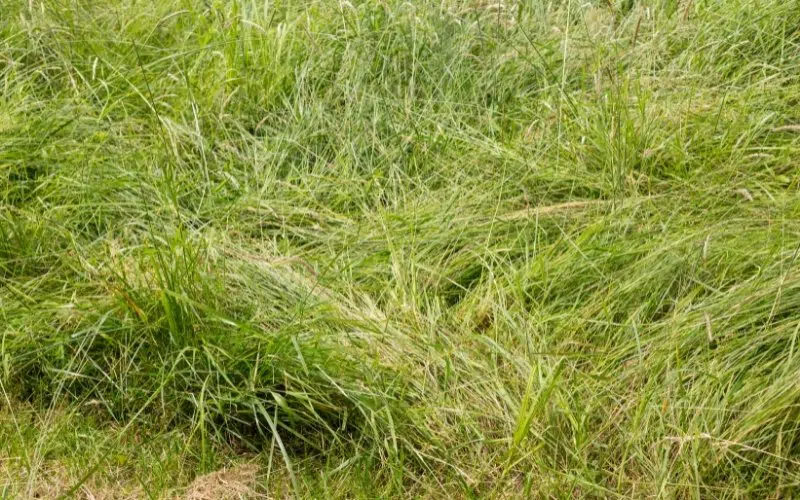
3. Footprints
If it’s rained a lot lately, the ground is likely to be a bit soft. This should allow for you to see what kind of animal has been through based on the footprints alone.
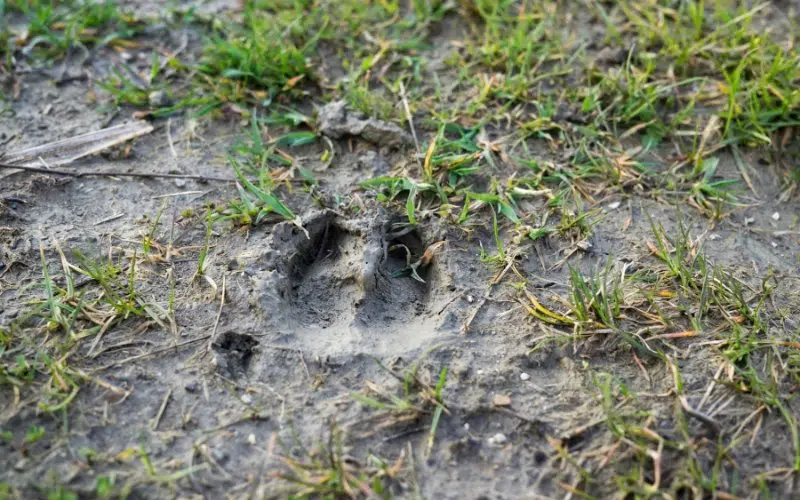
4. Deer Scat
Deer poop looks quite different from that of a rabbit or other animals. Deer scat will be in a round shape, all bundled up in a pile.
Rabbit scat would look similar, but smaller and more spread out. Rabbits poop on the move, while deer generally stand still.
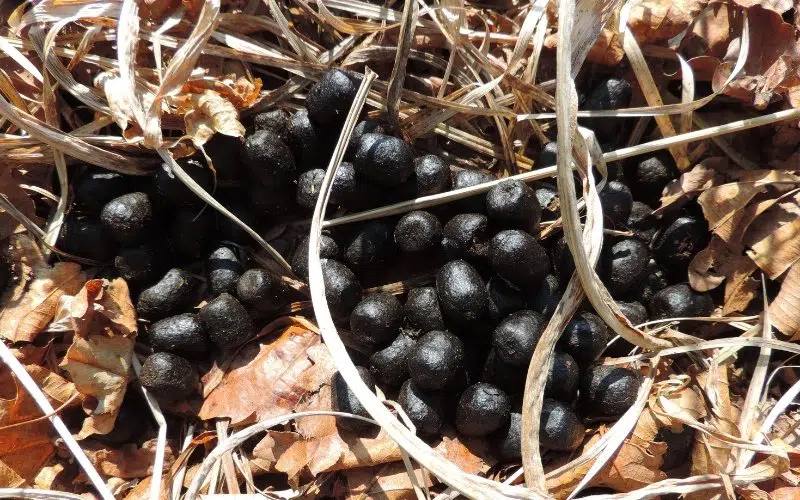
7 Other Methods to Keep Deer Out of the Garden
Planting deer resistant plants can help keep deer from coming to your garden in the middle of the night for a full meal. But sometimes, they just get a little too hungry and will go near the garden anyway.
Here are some great tips for deer proofing the garden.
1. Irish Spring Soap
Some people swear by this method, and some people hate it. But all in all it seems quite effective, especially when combined with other methods on this list.
Essentially, you’re going to put a few bars of Irish Spring soap into nylon stockings, or another material that allows the scent to permeate.
Will Irish Spring Hurt plants? Nope. Irish spring will just make your garden smell a lot like a bar of soap.
2. Red Cat Eyes
Red cat eyes can get a little creepy if you’re out in the garden at night. But they simulate a larger predator and will help scare off animals rummaging through your yard at night.
What a genius idea! These solar-powered lights create an eerie glow in your garden to help simulate a large predator and deter:
- Deer
- Fox
- Raccoons
- Coyote
- Skunk
- Cats
3. Motion Activated Sprinkler
This one is my favorite! It doesn’t hurt animals, but will certainly scare them (and give you a good laugh if you catch it on a trail camera).
It works well, I tested it out for myself this season and was pleasantly surprised. While it wasn’t super effective for birds, it definitely keeps the squirrels and deer away with it’s erratic movement and the noise of spraying water.
Here is a video of it in action in my garden:
A motion activated sprinkler works wonders for keeping animals (and people!) out of your yard. It sprays intermittently as it detects continuous motion so animals won't get used to the timing of it.
4. Wind Chimes
Hanging wind chimes near the garden can be a great way to create extra noise that will scare the deer off when the wind blows.
5. Deer Netting (Garden Netting)
Deer netting can be effective at avoiding deer damage to your plants. But don’t put it up like you would a fence. You want to place it overtop of your plants, like the picture below shows.
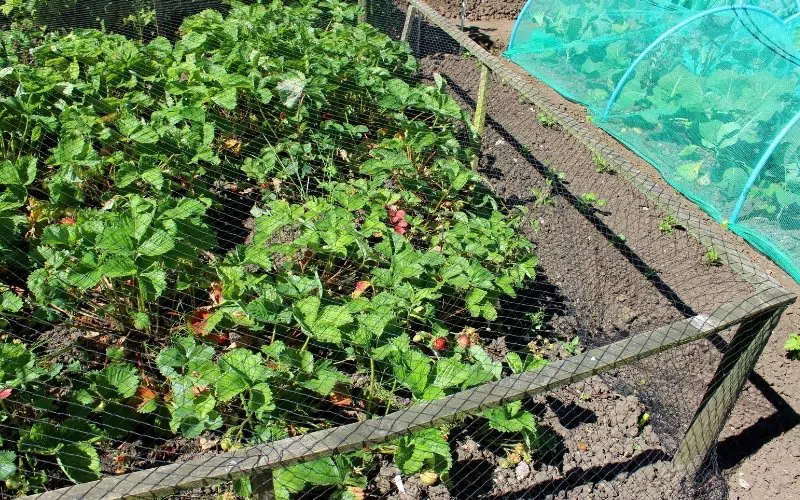
6. Plastic Scarecrow or Fake Owl
This is one of my favorite methods for keeping all kinds of animals away. The owl looks real and can scare off quite a few animals (works great for squirrels, too!)
Fake owls are great for keeping many animals out of the garden, including squirrels, deer, birds, and more.
7. Fencing
I put this one last because it’s very hard to do it properly. Deer can jump fences up to 8 feet tall – yes, you read that right.
Most fences are around 4-6 feet, and while that may seem tall enough, those deer are going to laugh at you for even trying.
Some plants offer deer resistance, but don’t let that give you a false sense of security. Even with a garden full of garlic, basil, and fragrant plants, you might still get a few unwanted visitors. That said, it’s best to combine plants that deer tend to avoid with another option like a motion-activated sprinkler or really tall fence.




